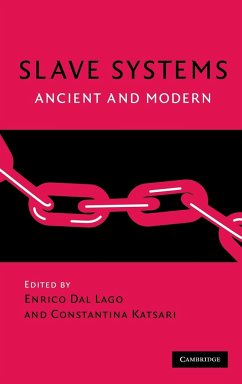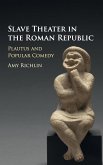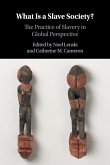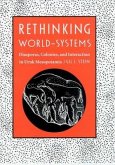Enrico Dal Lago / Constantina Katsari (eds.)Ancient and Modern
Slave Systems
Ancient and Modern
Herausgeber: Katsari, Constantina; Dal Lago, Enrico
Enrico Dal Lago / Constantina Katsari (eds.)Ancient and Modern
Slave Systems
Ancient and Modern
Herausgeber: Katsari, Constantina; Dal Lago, Enrico
- Gebundenes Buch
- Merkliste
- Auf die Merkliste
- Bewerten Bewerten
- Teilen
- Produkt teilen
- Produkterinnerung
- Produkterinnerung
This book compares features of slavery in ancient Greece and Rome and in the modern Atlantic world.
Andere Kunden interessierten sich auch für
![Slave Theater in the Roman Republic Slave Theater in the Roman Republic]() Amy RichlinSlave Theater in the Roman Republic141,99 €
Amy RichlinSlave Theater in the Roman Republic141,99 €![Bandits in the Roman Empire Bandits in the Roman Empire]() Thomas GrunewaldBandits in the Roman Empire196,99 €
Thomas GrunewaldBandits in the Roman Empire196,99 €![What is a Slave Society? What is a Slave Society?]() What is a Slave Society?39,99 €
What is a Slave Society?39,99 €![Kypriōn Politeia, the Political and Administrative Systems of the Classical Cypriot City-Kingdoms Kypriōn Politeia, the Political and Administrative Systems of the Classical Cypriot City-Kingdoms]() Beatrice PestarinoKypriōn Politeia, the Political and Administrative Systems of the Classical Cypriot City-Kingdoms157,99 €
Beatrice PestarinoKypriōn Politeia, the Political and Administrative Systems of the Classical Cypriot City-Kingdoms157,99 €![Rethinking World-Systems Rethinking World-Systems]() Gil J SteinRethinking World-Systems57,99 €
Gil J SteinRethinking World-Systems57,99 €![Documents Illustrative of the History of the Slave Trade to America; v.1 Documents Illustrative of the History of the Slave Trade to America; v.1]() Documents Illustrative of the History of the Slave Trade to America; v.143,99 €
Documents Illustrative of the History of the Slave Trade to America; v.143,99 €![Animal Sacrifice in the Ancient Greek World Animal Sacrifice in the Ancient Greek World]() Animal Sacrifice in the Ancient Greek World97,99 €
Animal Sacrifice in the Ancient Greek World97,99 €-
-
-
This book compares features of slavery in ancient Greece and Rome and in the modern Atlantic world.
Hinweis: Dieser Artikel kann nur an eine deutsche Lieferadresse ausgeliefert werden.
Hinweis: Dieser Artikel kann nur an eine deutsche Lieferadresse ausgeliefert werden.
Produktdetails
- Produktdetails
- Verlag: Cambridge University Press
- Seitenzahl: 390
- Erscheinungstermin: 15. April 2013
- Englisch
- Abmessung: 235mm x 157mm x 25mm
- Gewicht: 714g
- ISBN-13: 9780521881838
- ISBN-10: 0521881838
- Artikelnr.: 23543799
- Herstellerkennzeichnung
- Libri GmbH
- Europaallee 1
- 36244 Bad Hersfeld
- gpsr@libri.de
- Verlag: Cambridge University Press
- Seitenzahl: 390
- Erscheinungstermin: 15. April 2013
- Englisch
- Abmessung: 235mm x 157mm x 25mm
- Gewicht: 714g
- ISBN-13: 9780521881838
- ISBN-10: 0521881838
- Artikelnr.: 23543799
- Herstellerkennzeichnung
- Libri GmbH
- Europaallee 1
- 36244 Bad Hersfeld
- gpsr@libri.de
Part I. Slavery, Slave Systems, World History and Comparative History: 1.
The study of ancient and modern slave systems: setting an agenda for
comparison Enrico Dal Lago and Constantina Katsari; 2. Slavery, gender, and
work in the pre-modern world and early Greece: a cross-cultural analysis
Orlando Patterson; 3. Slavery as historical process: examples from the
ancient Mediterranean and the modern Atlantic Joseph C. Miller; Part II.
Economics and Technology of Ancient and Modern Slave Systems: 4. The
comparative economics of slavery in the Greco-Roman world Walter Scheidel;
5. Slavery and technology in pre-industrial contexts Tracey Rihll; 6.
Comparing or interlinking? Economic comparisons of early nineteenth-century
slave systems in the Americas in historical perspective Michael Zeuske;
Part III. Ideologies and Practices of Management in Ancient and Modern
Slavery: 7. Ideal models of slave management in the Roman world and the
Antebellum American South Enrico Dal Lago and Constantina Katsari; 8.
Panis, disciplina, et opus servo: the Jesuit ideology in Portuguese America
and Greco-Roman ideas of slavery Rafael de Bivar Marquese and Fabio Duarte
Joly; Part IV. Exiting Slave Systems: 9. Processes of exiting the slave
systems: a typology Olivier Pétrè-Grenouilleau; 10. Emancipation schemes:
different ways of ending slavery Stanley Engerman; Part V. Slavery and
Unfree Labor, Ancient and Modern: 11. Spartiates, helots, and the direction
of the agrarian economy: toward an understanding of helotage in comparative
perspective Stephen Hodkinson.
The study of ancient and modern slave systems: setting an agenda for
comparison Enrico Dal Lago and Constantina Katsari; 2. Slavery, gender, and
work in the pre-modern world and early Greece: a cross-cultural analysis
Orlando Patterson; 3. Slavery as historical process: examples from the
ancient Mediterranean and the modern Atlantic Joseph C. Miller; Part II.
Economics and Technology of Ancient and Modern Slave Systems: 4. The
comparative economics of slavery in the Greco-Roman world Walter Scheidel;
5. Slavery and technology in pre-industrial contexts Tracey Rihll; 6.
Comparing or interlinking? Economic comparisons of early nineteenth-century
slave systems in the Americas in historical perspective Michael Zeuske;
Part III. Ideologies and Practices of Management in Ancient and Modern
Slavery: 7. Ideal models of slave management in the Roman world and the
Antebellum American South Enrico Dal Lago and Constantina Katsari; 8.
Panis, disciplina, et opus servo: the Jesuit ideology in Portuguese America
and Greco-Roman ideas of slavery Rafael de Bivar Marquese and Fabio Duarte
Joly; Part IV. Exiting Slave Systems: 9. Processes of exiting the slave
systems: a typology Olivier Pétrè-Grenouilleau; 10. Emancipation schemes:
different ways of ending slavery Stanley Engerman; Part V. Slavery and
Unfree Labor, Ancient and Modern: 11. Spartiates, helots, and the direction
of the agrarian economy: toward an understanding of helotage in comparative
perspective Stephen Hodkinson.
Part I. Slavery, Slave Systems, World History and Comparative History: 1.
The study of ancient and modern slave systems: setting an agenda for
comparison Enrico Dal Lago and Constantina Katsari; 2. Slavery, gender, and
work in the pre-modern world and early Greece: a cross-cultural analysis
Orlando Patterson; 3. Slavery as historical process: examples from the
ancient Mediterranean and the modern Atlantic Joseph C. Miller; Part II.
Economics and Technology of Ancient and Modern Slave Systems: 4. The
comparative economics of slavery in the Greco-Roman world Walter Scheidel;
5. Slavery and technology in pre-industrial contexts Tracey Rihll; 6.
Comparing or interlinking? Economic comparisons of early nineteenth-century
slave systems in the Americas in historical perspective Michael Zeuske;
Part III. Ideologies and Practices of Management in Ancient and Modern
Slavery: 7. Ideal models of slave management in the Roman world and the
Antebellum American South Enrico Dal Lago and Constantina Katsari; 8.
Panis, disciplina, et opus servo: the Jesuit ideology in Portuguese America
and Greco-Roman ideas of slavery Rafael de Bivar Marquese and Fabio Duarte
Joly; Part IV. Exiting Slave Systems: 9. Processes of exiting the slave
systems: a typology Olivier Pétrè-Grenouilleau; 10. Emancipation schemes:
different ways of ending slavery Stanley Engerman; Part V. Slavery and
Unfree Labor, Ancient and Modern: 11. Spartiates, helots, and the direction
of the agrarian economy: toward an understanding of helotage in comparative
perspective Stephen Hodkinson.
The study of ancient and modern slave systems: setting an agenda for
comparison Enrico Dal Lago and Constantina Katsari; 2. Slavery, gender, and
work in the pre-modern world and early Greece: a cross-cultural analysis
Orlando Patterson; 3. Slavery as historical process: examples from the
ancient Mediterranean and the modern Atlantic Joseph C. Miller; Part II.
Economics and Technology of Ancient and Modern Slave Systems: 4. The
comparative economics of slavery in the Greco-Roman world Walter Scheidel;
5. Slavery and technology in pre-industrial contexts Tracey Rihll; 6.
Comparing or interlinking? Economic comparisons of early nineteenth-century
slave systems in the Americas in historical perspective Michael Zeuske;
Part III. Ideologies and Practices of Management in Ancient and Modern
Slavery: 7. Ideal models of slave management in the Roman world and the
Antebellum American South Enrico Dal Lago and Constantina Katsari; 8.
Panis, disciplina, et opus servo: the Jesuit ideology in Portuguese America
and Greco-Roman ideas of slavery Rafael de Bivar Marquese and Fabio Duarte
Joly; Part IV. Exiting Slave Systems: 9. Processes of exiting the slave
systems: a typology Olivier Pétrè-Grenouilleau; 10. Emancipation schemes:
different ways of ending slavery Stanley Engerman; Part V. Slavery and
Unfree Labor, Ancient and Modern: 11. Spartiates, helots, and the direction
of the agrarian economy: toward an understanding of helotage in comparative
perspective Stephen Hodkinson.








